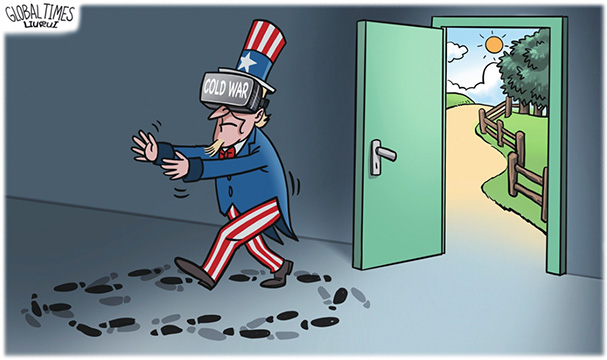
The US-led ‘rules-based international system’ is a more recent evolution of American political thinking: a self-referential mindset twisted to the interests of Washington and its allies, writes Marco Carnelos, a former Italian diplomat, at ‘The Middle East Eye’.
The US intelligence community recently released its annual threat assessment, which focuses on worldwide threats to the country’s national security. The document reflects the collective analyses and insights of the Central Intelligence Agency, National Security Agency, Federal Bureau of Investigation and more than a dozen other agencies.
The report’s foreword provides a clear sense of this community’s dystopian and self-referential thinking: "During the next year, the United States faces an increasingly fragile global order strained by accelerating strategic competition among major powers, more intense and unpredictable transnational challenges, and multiple regional conflicts with far-reaching implications."
Iran, Russia and China are thus the main villains for allegedly challenging longstanding rules of the international system. No surprises here; this has been a US policy mantra for years.
The problem, rather, is that it is not clear to which rules the report is referring: the customary international law enshrined in the UN Charter and UN conventions, or the so-called US-led rules-based world order. The main conceptual problem is that for the US political establishment and its key western allies, there is no distinction. But as is often the case, they are grossly mistaken.
International law and the UN Charter are the pillars of the global order built after the Second World War, to which the US provided an outstanding contribution. Conversely, the US-led rules-based international system is a more recent evolution of American political thinking: a self-referential mindset twisted to the interests of Washington and its allies.
This order is based on neoliberal ideology and imbued with double standards, of which the tragedy unfolding in Gaza is the latest and most visible example.
Based on a series of assumptions, such as US exceptionalism and the undisputed superiority of western democracies (ie, “western civilisation”), this system claims national laws as universal ones. It assumes a set of values and connected rules, but is quite careful not to implement them when they collide with its own interests. This order can be summarised by an informal motto: “For my friends, everything; for my enemies, the law.”
It seems that the real crime is not challenging the system itself, but rather US hegemony. Yet, while such a preposterous position could still have been accepted a few years ago, it is now openly challenged – or at least resented – by many countries across the so-called Global South.
Only a minority of countries in Europe and East Asia consider US primacy to be an essential prerequisite of a stable international system. In fact, scrutiny of the last two decades of history proves the opposite.
The global order is shifting from a unipolar configuration centred on the US to a multipolar one. Throughout history, empires have risen and then collapsed. US policymakers would be wise to adjust to these rules of history and give up on the notion of their indispensability. They now face a binary choice: accept history’s verdict, as the UK has progressively done since 1945, or catastrophically resist it.
Meanwhile, the US threat assessment attributes to China “the capability to directly compete with the United States and U.S. allies and to alter the rules-based global order”. It thus equates a simple Chinese capability into a deliberate intent pursued by its leadership, while indirectly confirming that in US official thinking, the only world order that can be contemplated is one led by Washington.
If the US intelligence community’s analysts have been surprisingly smart and honest in recognising this problem, known by international relations experts as the concept of “the indivisibility of security” (ie, any security measure taken by one nation can be interpreted as a threat by another), they should also be able to admit that their tendency to equate hypothetical capabilities with automatic intentions, is a big part of the increased tensions characterising modern geopolitics.
read more in our Telegram-channel https://t.me/The_International_Affairs

 9:55 16.06.2024 •
9:55 16.06.2024 •






















